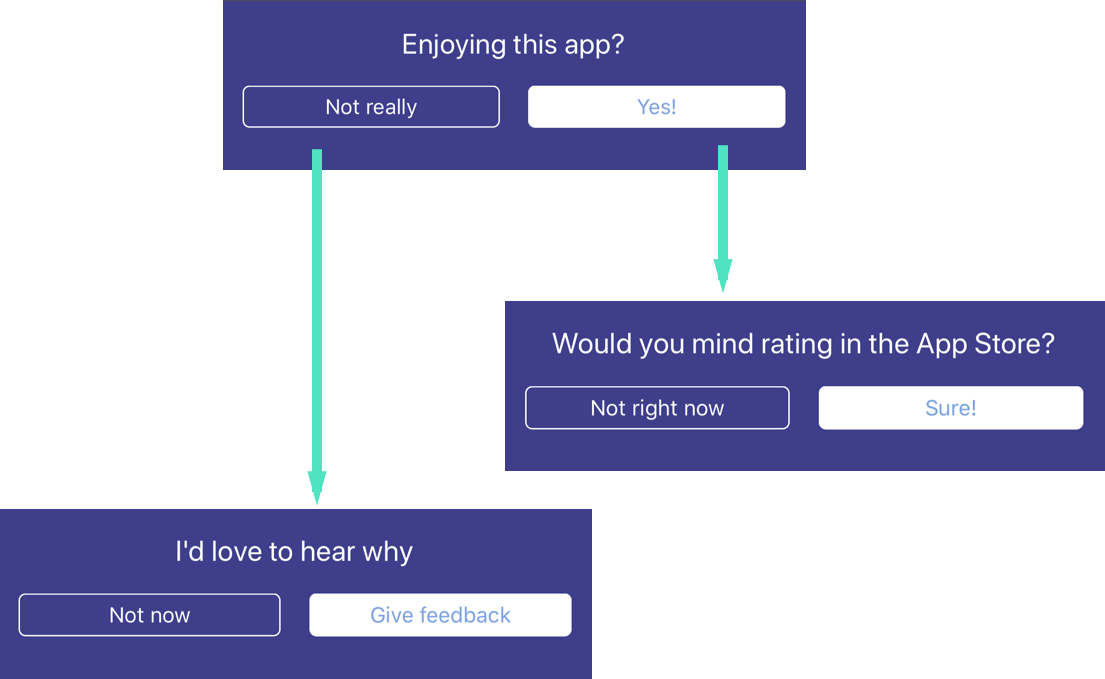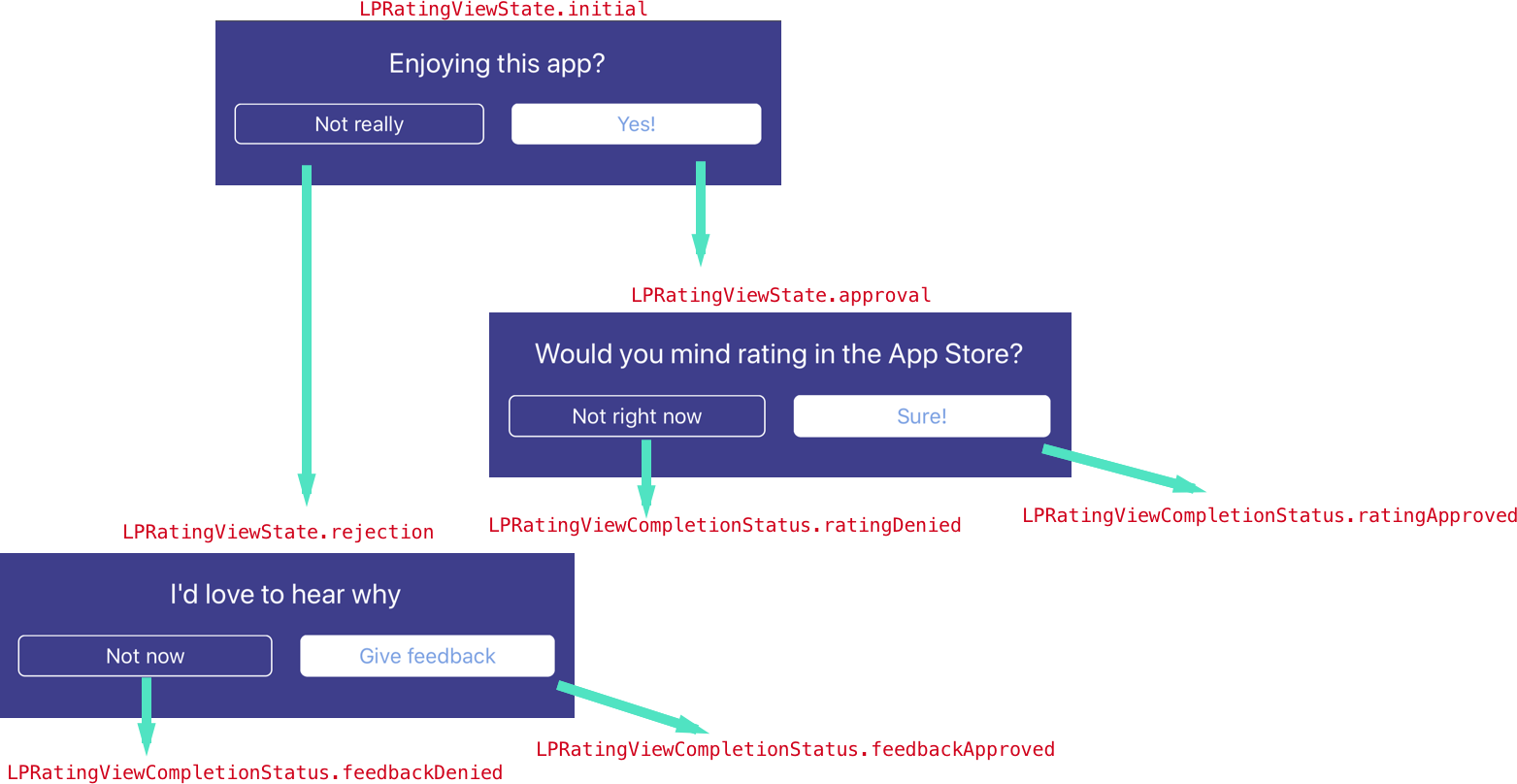LPIntegratedRating 1.0.0
| TestsTested | ✗ |
| LangLanguage | SwiftSwift |
| License | MIT |
| ReleasedLast Release | Jun 2017 |
| SwiftSwift Version | 4.0 |
| SPMSupports SPM | ✗ |
Maintained by Luis Padron, Luis Padron.
LPIntegratedRating 1.0.0
- By
- Luis Padron
An integrated rating view for iOS built with Swift 4
Features
- Stops users feeling annoyed from pop ups asking for ratings.
- Customizable for your app needs.
- Easy to use with
UITableView's andUICollectionViews's.
Installation
From Source
- Simply download the source from here and add it to your Xcode project
Usage
Delegate conformance
You must conform to the delegate in order to customize the view.
Here is an example:
extension ViewController: LPRatingViewDelegate {
func ratingViewDidFinish(with status: LPRatingViewCompletionStatus) {
switch status {
case .ratingApproved:
print("Rating approved")
case .ratingDenied:
print("Rating denied")
case .feedbackApproved:
print("Feedback approved")
case .feedbackDenied:
print("Feedback denied")
}
}
func ratingViewConfiguration(for state: LPRatingViewState) -> LPRatingViewConfiguration? {
switch state {
case .initial:
let title = NSAttributedString(string: "Enjoying this app?",
attributes: [.foregroundColor: UIColor.white])
let title2 = NSAttributedString(string: "Yes!",
attributes: [.foregroundColor: UIColor(red: 0.376, green: 0.788, blue: 0.773, alpha: 1.00)])
let title3 = NSAttributedString(string: "Not really",
attributes: [.foregroundColor: UIColor.white])
return LPRatingViewConfiguration(title: title,
approvalButtonTitle: title2,
rejectionButtonTitle: title3)
case .approval:
let title = NSAttributedString(string: "How about rating, then?",
attributes: [.foregroundColor: UIColor.white])
let title2 = NSAttributedString(string: "Ok, sure",
attributes: [.foregroundColor: UIColor(red: 0.376, green: 0.788, blue: 0.773, alpha: 1.00)])
let title3 = NSAttributedString(string: "No, thanks",
attributes: [.foregroundColor: UIColor.white])
return LPRatingViewConfiguration(title: title,
approvalButtonTitle: title2,
rejectionButtonTitle: title3)
case .rejection:
let title = NSAttributedString(string: "Would you mind giving us some feedback",
attributes: [.foregroundColor: UIColor.white])
let title2 = NSAttributedString(string: "Ok, sure",
attributes: [.foregroundColor: UIColor(red: 0.376, green: 0.788, blue: 0.773, alpha: 1.00)])
let title3 = NSAttributedString(string: "No, thanks",
attributes: [.foregroundColor: UIColor.white])
return LPRatingViewConfiguration(title: title,
approvalButtonTitle: title2,
rejectionButtonTitle: title3)
}
}
}
UITableView
Simply create an instance of LPRatingTableViewCell, assign the delegate and return it!
override func tableView(_ tableView: UITableView, cellForRowAt indexPath: IndexPath) -> UITableViewCell {
let cell = LPRatingTableViewCell(style: .default, reuseIdentifier: nil)
cell.delegate = self
return cell
}UICollectionView
First register the class
override func viewDidLoad() {
super.viewDidLoad()
// Register class
collectionView?.register(LPRatingCollectionViewCell.self, forCellWithReuseIdentifier: "testCell")
}Then simply create an instance of LPRatingCollectionViewCell, assign the delegate and return it
override func collectionView(_ collectionView: UICollectionView, cellForItemAt indexPath: IndexPath) -> UICollectionViewCell {
let cell = collectionView.dequeueReusableCell(withReuseIdentifier: "testCell", for: indexPath) as! LPRatingCollectionViewCell
cell.delegate = self
return cell
}View Flow
Here is the flow of the view, and the types of cases that will be passed to the delegate along the way.
Documentation
Read the full documentation here


